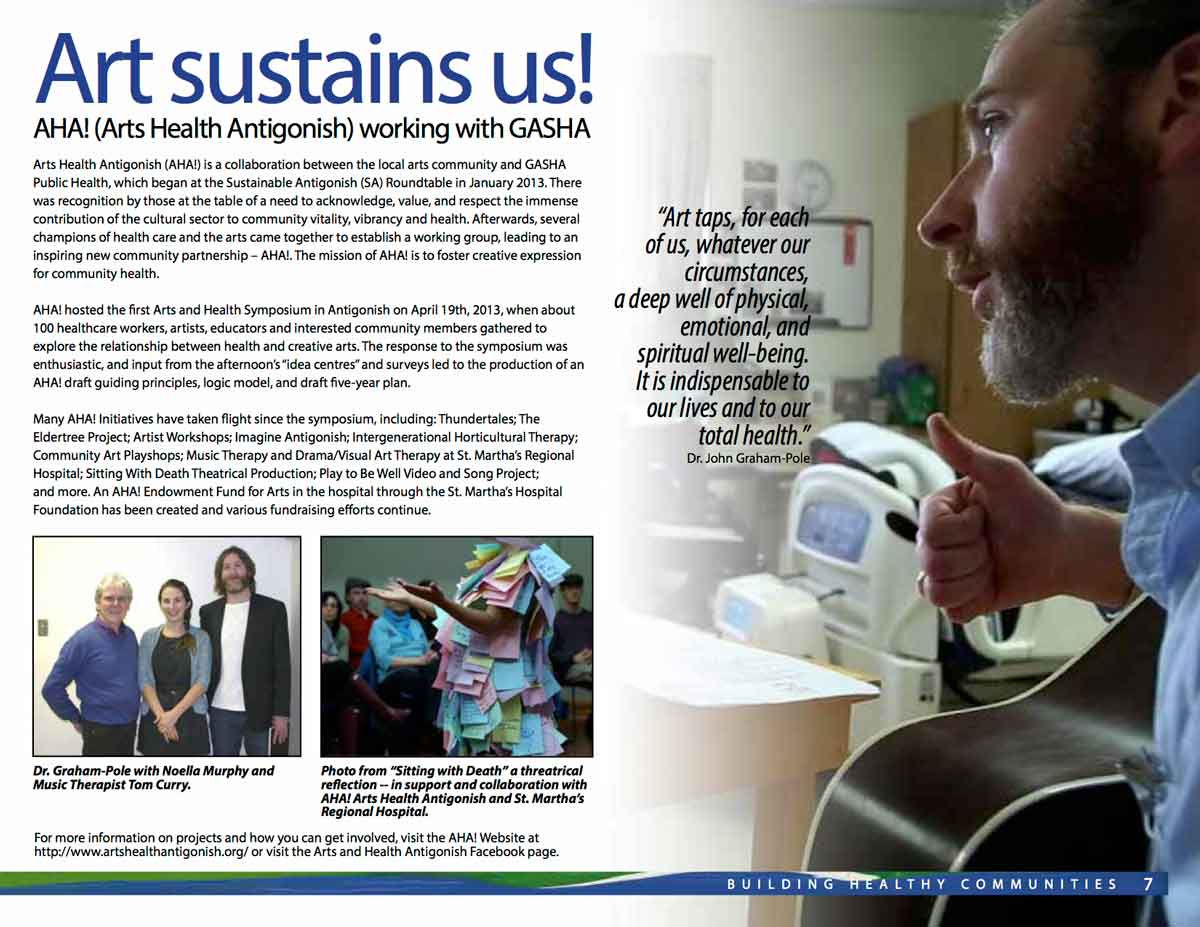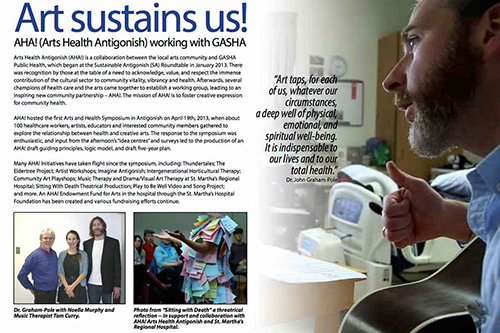Tom Curry
About Tom
Tom Curry, a graduate of Acadia University, holds a Certificate In Music Therapy (2012). Additionally, Tom completed a Diploma in Jazz Studies (2006), and at Bachelor in Arts with Major in Music (2009) from St. Francis Xavier. In May 2012, Tom began his internship, under Peter Mutch at Catholic Family Services, Charlottetown P.E.I. Tom had the opportunity to work with Adults with intellectual disabilities, youth with autism and troubled youth. Following his time in Charlottetown he worked for Heartsparkes Music Therapy, where he worked with Homebridge Youth Society, individuals with autism and muscular dystrophy.
Currently, Tom is available to provide music therapy for groups and one-on-one sessions to all populations within the Halifax regional municipality.
If you have any questions regarding music therapy or services, please feel free to contact Tom.
Working with Arts Health Antigonish
Tom Curry, Music Therapist, has provided individual and group-based services at St. Martha’s Regional Hospital in Antigonish since November 2013. His position has been funded through various grants and donations via Arts Health Antigonish. The introduction of music therapy has contributed to many positive outcomes for patients, families and staff. Some have said that music therapy has provided a way to “engage people socially, re-introduce them to positive coping, build self-esteem, and encourage participation in activities of daily living”. Others have said it’s provided adults with cognitive impairment, a reconnection to memories and abilities of their past which has been therapeutic and has offered much comfort to some patients in their last weeks of life. The addition of this service has been a powerful and transformative enhancement to patient and family-centred care.

From Musician to Therapist
TOM CURRY EXPLAINS THE BENEFITS OF MUSIC THERAPY
By Jon Grant
Tom Curry is living out his dreams through music therapy.Curry, a prominent singer-songwriter from Nova Scotia, decided to study the field after seeing the positive effect of his songs on his 91-year-old grandmother when she developed dementia after taking a fall.“She became very anxious ... and it was really difficult for us to experience because she was such a mobile, active woman prior to that,” remembers Curry."I started to bring my guitar up to her hospital room and play her three favourite songs. I'd walk in and she'd be very anxious ... but then I'd start playing guitar and she would totally chill out."
Upon graduating the music therapy program at Acadia University, Curry accepted an internship at Heartsparks Music Therapy in Halifax.
Heartsparks Music Therapy, founded by Anna Plaskett, deals with a diverse array of clients.
Curry immediately identified with her work.
“She was dealing with seniors and youth at risk, and children and adults with autism, and children and adults with muscular dystrophy. That was the direction I really wanted to go in" he says.
He wants to use his music to give back to those in need.
"Music therapy is using music and the elements of music to foster a positive change in someone physically, mentally, emotionally, or spiritually" he adds.
There are many myths surrounding the field of music therapy. It's not true that therapists simply play music that makes people feel better – clients can be treated for mental or physical illness through different elements of music and performance.
A client suffering from Alzheimer's might gain increased cognitive skills by singing; clients with muscular dystrophy may experience increased motor skills through movements involved.
Curry's internship taught him to treat each client as an individual. Different people react different to different approaches, and Heartsparks exposed him to several different methods.
"I take a laid back approach and try to figure out how the root music resonates with them and how it makes them react. I do that through playing, I do that through getting them involved" he says.
He chooses a laid back approach because he doesn't “want to make people feel like they're on stage.” Getting to know clients through improvisation to see what will evoke a reaction has been a growing experience for Curry.
One of the key components of music therapy is motivating clients to discover how to express themselves through music.
Curry describes a typical scenario where he creates and tells a story with a client, and eventually implements music.
"The hope is that (the client) acquires all these musical skills and as his condition progresses down the road he will have those skills to express himself,” he says. “As the physicality of his body breaks down he will still be able to express himself through certain avenues. The hope is that it will help him cope with having muscular dystrophy while all of his peers don't.”
One of the rewarding aspects of music therapy, he adds, is the ability to pursue music professionally while helping others.
"It really works and you can see it work. It works over a span and you get these little moments that are really exciting when you're working with someone, and you both get those.”
As with any career, there are challenges. Many music therapy programs are funded through community organizations such as Home Bridge, but funding for programs is generally limited. Many clients are not able to pay for therapy out of pocket.
Curry takes home many musical ideas generated through his experience with clients to use in his own practise. He continues to play live shows in and around Halifax and recently released an album with the rock band Scrapes.


